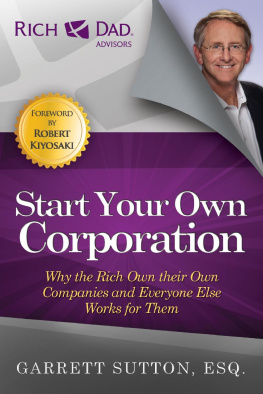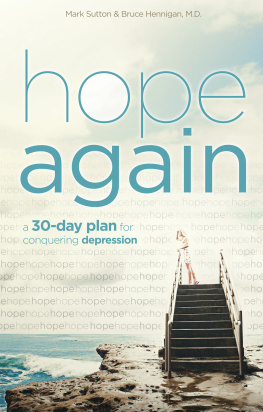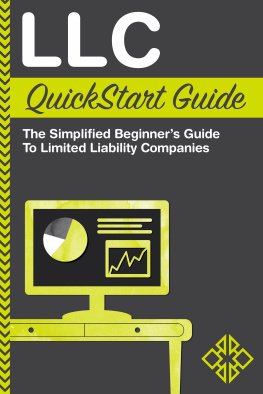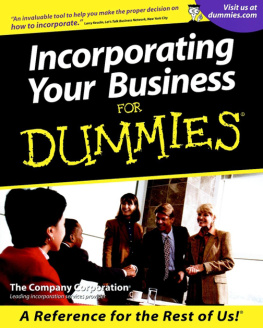Start Your Own Corporation:
Why the Rich Own their Own Companies and Everyone Else Works for Them
Garrett Sutton, Esq.
Start Your Own Corporation reveals the secrets the rich have used to limit their liability, protect their assets and minimize their taxes. Originally published as Own Your Own Corporation in the Rich Dads Advisor series, and one of the best selling books on the advantages of incorporating, Start Your Own Corporation has been updated and re-released to better assist entrepreneurs and investors with asset protection strategies. A companion book, Run Your Own Corporation, is being released to address the all too often asked question entrepreneurs have: Ive set up my corporation, now what do I do?
Start Your Own Corporation offers advice on the right choice of entity, business tax deductions and building business credit. The book also discussed how to raise money for your company and how to be on the look out for corporate scam artists looking to separate money from your new business. As well, the key issue of maintaining the corporate veil is addressed to the readers great benefit.
Using illustrative stories and examples, Start Your Own Corporation is a clearly written and easy to understand guide into the whys and hows of corporate protection. As Robert Kiyosakis rich dad said: If you are serious about being rich and keeping your wealth, understanding corporations and other legal structures is an important part of your ongoing financial education.
This publication is designed to provide competent and reliable information regarding the subject matter covered. However, it is sold with the understanding that the author and publisher are not engaged in rendering legal, financial, or other professional advice. Laws and practices often vary from state to state and country to country and if legal or other expert assistance is required, the services of a professional should be sought. The author and publisher specifically disclaim any liability that is incurred from the use or application of the contents of this book.
Copyright 2001, 2008, 2012 by Garrett Sutton, Esq. All rights reserved. Except as permitted under the U.S. Copyright Act of 1976, no part of this publication may be reproduced, distributed, or transmitted in any form or by any means or stored in a database or retrieval system, without the prior written permission of the publisher.
Published by RDA Press
An imprint of BZK Press, LLC
Rich Dad Advisors, B-I Triangle, CASHFLOW Quadrant and other Rich Dad marks are registered trademarks of CASHFLOW Technologies, Inc.
BZK Press LLC
15170 N. Hayden Road
Scottsdale, AZ 85260
480-998-5400
Visit our Web sites: BZKPress.com and RichDadAdvisors.com
First Edition: October, 2001 (as Own Your Own Corporation)
First BZK Press edition: February, 2012
ISBN: 978-1-937832-35-3
Acknowledgments
This book is dedicated to my wonderful wife, Jenny, and our terrific kids, Teddy, Emily, and Sarah. Thank you for your understanding as this book was being written.
I would like to acknowledge the assistance of Robert Kiyosaki and Mona Gambetta in the revision and updating of this book. Thank you.
Contents
by Robert Kiyosaki
When I was ten years old and in the fifth grade, I began to read about the great explorers, such as Columbus, Magellan, Cortez, daGama, Cook. I dreamed of someday traveling the world in a wooden ship, in search of treasures in unexplored lands. I read every book I could about their lives and adventures. In the fifth grade, I often had the highest scores on the tests and quizzes about the great explorers.
You read about the explorers who were successful, said rich dad. What about the explorers who failed? Rich dad was helping me prepare for my final exam in the fifth grade.
The ones who failed? I asked.
Yes, the ones who failed, said rich dad. In school they teach you about the successful explorers or the famous explorers. There were many more explorers who were not successful and not famous whom we have never heard about, nor will we ever hear about them.
Why is studying about the explorers who failed so important? I asked.
Because you need to know how the owners and the investors in those failed voyages protected themselves against the repercussions from such failures, said rich dad.
Repercussions? I asked. What kind of repercussions?
Such things as the loss of life, said rich dad. The owners and investors wanted to protect themselves and their fortunes from the families of the explorer and his crew in the event there was a loss of life on the voyage.
You mean the men on the ship risked and sometimes lost their lives, and all the owners and investors on land wanted to do was protect themselves from losing money? Thats one of the repercussions youre talking about?
Rich dad nodded his head. He then began to tell me about the Dutch East India Company and the British East India Company, two of the more powerful and famous corporations behind some of those explorers. Some of these corporations even had their own navy and army to control access to their nations overseas wealth. He told me how these corporations in many ways took over whole countries, such as New Zealand, Hawaii, Australia, Malaysia, Indonesia, South Africa, and other parts of the world. One of those countries was one day to become the United States of America. Rich dad pointed out to me that the flag of the United States was originally the flag of the British East India Company, reportedly modified by Betsy Ross. While England may have lost control over its colonies, the British East India Company simply changed its namea simple d.b.a.and kept on trading.
The more rich dad told me about the corporations behind these great explorers and how they shaped world history, the more interested I became in global business and doing business through a corporation. When I was sixteen, I began applying for a congressional appointment to the U.S. Merchant Marine Academy, the federal military school that trains young men to sail ships of the merchant marine. Kings Point, which the school is also known as, continues to train young people to replace the great seafaring explorers. Only two students from Hawaii are admitted to this little known federal academy each year, so I felt fortunate to be accepted after passing rigorous exams and interviews. At age eighteen, I began sailing as a student onboard ships carrying cargo along the same trade routes established by Ferdinand Magellan and Captain James Cook. I quickly realized that although the early explorers are gone, some of those corporations rich dad talked about still exist today, and the U.S. government funds the education of these corporations leaders. I began to understand why rich dad told me years ago, Dont just study the explorer and his ships, study the power of the corporations behind the explorer and his ships.
747 Replaces Cargo Ships
Today I travel by 747 rather than by cargo ship. Although my mode of transportation has changed, I have heeded rich dads advice and learned my lessons well. Today I travel as a representative of several corporationsthe difference is that I control those corporations rather than simply work for them.
As I stated in Rich Dad Poor Dad, my poor dad thought it was a good idea to be a good employee and climb the corporate ladder, while my rich dad said, Dont climb the corporate ladder, why not own the corporate ladder? Rich dad also said, The problem with climbing the corporate ladder is that when you look up, you see somebodys big fat butt above you. On a more serious note, he said, The two main reasons you need to Start Your Own Corporation are for protection against lawsuits and against excessive taxes, yet there are many other reasons and other strategies. The point is, if you are serious about being rich and keeping your wealth, understanding corporations and other legal structures is an important part of your ongoing financial education.








